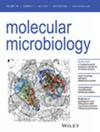Characterization of a Novel RNA Polymerase Mutant of Escherichia coli That Confers Thermotolerance and Chaperone Independence
IF 2.6
2区 生物学
Q3 BIOCHEMISTRY & MOLECULAR BIOLOGY
引用次数: 0
Abstract
Bacterial cells activate stress‐sensing and stress‐mitigating pathways by employing a number of transcription regulators, some of which can bind directly to RNA polymerase to activate stress‐specific response pathways. However, mutations in the RNA polymerase genes can accumulate under certain selection conditions and activate stress‐mitigating pathways in a manner that is partly independent of pathway‐specific regulators. In this study, we characterized a novel mutation in the一种具有耐热性和伴侣独立性的新型大肠杆菌RNA聚合酶突变体的鉴定
细菌细胞通过使用一些转录调节因子来激活应激感应和应激缓解途径,其中一些转录调节因子可以直接结合RNA聚合酶来激活应激特异性反应途径。然而,RNA聚合酶基因的突变可以在一定的选择条件下积累,并以一种部分独立于途径特异性调节因子的方式激活应激缓解途径。在这项研究中,我们在rpoB基因中发现了一个新的突变,该突变在缺乏由relA基因产物产生的关键严格反应(SR)激活因子(p)ppGpp的情况下,将RNA聚合酶转化为“严格”聚合酶。突变RNA聚合酶等位基因rpoB58提高了耐热性,并且在不允许表达野生型RNA聚合酶基因的细胞在不允许的温度下生长,不需要关键分子伴侣(DnaKJ)和蛋白酶(Lon, ClpP)。值得注意的是,rpoB58也逆转了ΔdnaJ在非允许温度下的细胞分裂缺陷,但不能克服其λ噬菌体抗性表型。rpoB58介导的ΔdnaKJ生长缺陷的修复在缺乏DksA的情况下部分逆转,DksA是一种与(p)ppGpp协同作用将RNA聚合酶转化为严格状态的蛋白质。数据表明,预激活的SR通过降低蛋白质合成而具有耐热性和伴侣蛋白独立性。
本文章由计算机程序翻译,如有差异,请以英文原文为准。
求助全文
约1分钟内获得全文
求助全文
来源期刊

Molecular Microbiology
生物-生化与分子生物学
CiteScore
7.20
自引率
5.60%
发文量
132
审稿时长
1.7 months
期刊介绍:
Molecular Microbiology, the leading primary journal in the microbial sciences, publishes molecular studies of Bacteria, Archaea, eukaryotic microorganisms, and their viruses.
Research papers should lead to a deeper understanding of the molecular principles underlying basic physiological processes or mechanisms. Appropriate topics include gene expression and regulation, pathogenicity and virulence, physiology and metabolism, synthesis of macromolecules (proteins, nucleic acids, lipids, polysaccharides, etc), cell biology and subcellular organization, membrane biogenesis and function, traffic and transport, cell-cell communication and signalling pathways, evolution and gene transfer. Articles focused on host responses (cellular or immunological) to pathogens or on microbial ecology should be directed to our sister journals Cellular Microbiology and Environmental Microbiology, respectively.
 求助内容:
求助内容: 应助结果提醒方式:
应助结果提醒方式:


